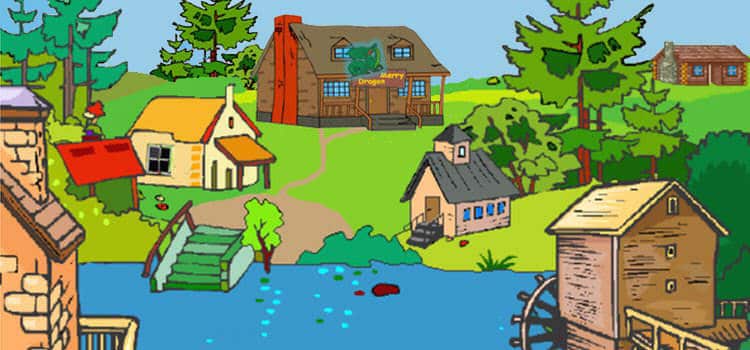
[America, around 1725] For ten years Anton and his foster son Andy had been living in Pennsylvania. They had a fine stone house at the Brandywine Creek, and all their friends lived nearby.
He and Andy had helped build a country road, and they named it Mirbi Creek Street in his honor. The German name Mirbesbach was too complicated, Bradock had said, so it became Mirbi Creek.
A new life
In the evening Anton often made a walk along the Brandywine Creek, talked to his neighbors, or just sat down on a wooden bench and enjoyed the surrounding peace. He was deeply grateful for his life in the New World, his town, the beautiful nature around him and the people whom he was very fond of. And yet, his old homeland, the Siebengebirge and the Rhine, remained in his heart. Now and then a ship brought letters from his sister-in-law, and Anton was happy when he could send a letter back to her. “More and more people are settling down here and so our town is growing every day,” he wrote, “now we have a house for each family, fruit and vegetable gardens, a mill, and soon we will also have a church, for my grandchildren will be baptized here.”
Andy and Cathy
Anton smiled as he thought of his foster son Andy and his daughter-in-law Cathy. Their childhood friendship had become love, the two had married and Lady Meredith had insisted on hosting her protégée’s wedding. Bradock had brought a violin and Sean a flute, and they all had danced until late at night.
Now Andy and Cathy had jointly opened a country inn named “Merry Dragon”. Bradock and Sean supplied them with fresh bread and vegetables from their farm. Above the entrance was a large, cheerful-looking dragon carved by Andy himself. On the lawn around the inn small yellow flowers with black heads grew, the Black-eyed Susan that are native to the East Coast of the United States. “My Lizbeth would love it here,” Anton had said softly to Andy, “she always loved field flowers.” And now Andy and Cathy were proud parents of a little boy whom they had named Ambrose, in honor of Lady Meredith’s beloved husband.
Redemptioners
Anton’s skills as a master-builder had quickly spread, and so many people asked him for advice. One day, he was visiting farmer Jonas who was building a new house for his family. Slowly, they walked around the building and Anton was satisfied with the work done so far. “It’s a fine house,” he said, “and as to the chimney, I suggest …”
Smilingly the farmer interrupted him. “It would be best to explain that to my craftsman Hannes right away,” he said, “look, there he is. By the way, you can speak German with him.” Slowly they went over to Hannes. “Is he a new settler in our town?” Anton asked. “No,” Jonas replied, “he’s a redemptioner, an indentured servant. When he went on board of the ship, he committed himself to work for several years for an American employer without being paid, and so he came to me. In return, I paid the captain for the passage on board of his ship.”
A new chance
Hannes and Anton got to know each other well while working on Jonas’ house. The farmer was delighted, and he often smoked a pipe with Anton in the evening. “You like this young men, don’t you?” he asked one evening. “Yes,” Anton said simply. Jonas nodded. “He’s a good fellow,” he said, “and also keen and well-educated. His service time with me will end soon, and he deserves a chance.” And then he added with a mischievous smile, “and you are already thinking about recruiting him as a teacher for your new school, aren’t you? Go ahead and ask him!” And while Anton was marveled and at a loss for words, he concluded: “After all, we want bright kids!”. And the day of farmer Jonas’ house-warming party, one saw a happy Hannes welcoming his little protégés and their parents.

Be the first to comment